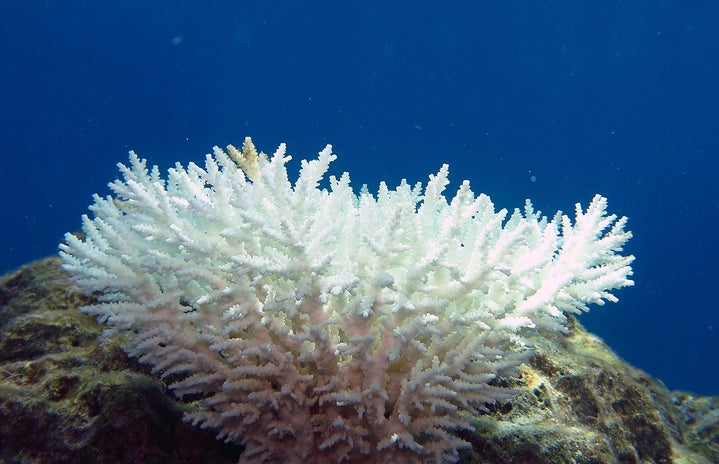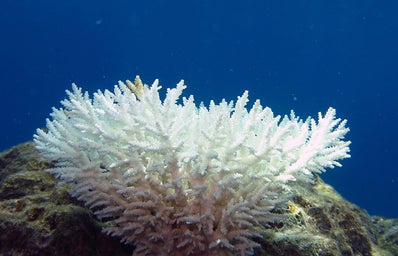As we head into the coldest months of the year, thoughts of climate change and the environment are probably low on people’s minds. Thoughts of coral specifically are most likely nonexistent, except for those who are fortunate enough to live in a tropical paradise. However, I’m here to tell you that coral and climate change should be on your mind. Coral is being significantly impacted greenhouse gas emissions, which have caused ocean temperatures to rise. Almost 93% of the excess heat trapped by the greenhouse gases in our atmosphere is absorbed by the ocean.
Without the absorption of extra heat, the average temperature on Earth would be over 122℉, deadly to almost all living organisms. This absorption leads to a greater increase in the ocean’s temperatures than the atmosphere, meaning that many people do not realize how severe the heating of the Earth is. The coral cannot adapt to the quickness and severity of the rising temperatures, leading to mass bleaching events. When a coral “bleaches,” it turns white, as the photosynthesizing algae do not function properly, and the coral begins to starve. The coral stops growing and reproducing, and if it cannot recover, it dies and leaves only a skeleton.
You may ask why this matters as coral are similar to plants in that they are pretty much stationary, and there are some who lack the perspective to see their importance. However, coral is the only animal on the planet other than humans that create their habitat and structures as we build skyscrapers and cities. They are the foundation of the larger coral reef ecosystem, and without them, fish and other organisms will leave the area. Coral reefs are biodiversity hotspots vital to a healthy, functioning ecosystem, with over 25% of all marine life depending on coral reefs for food and shelter. Additionally, coral reefs are a source of income for over five million people, and over half a billion people in the world rely on coral reefs as their primary source of food. Coral reefs are not just a beautiful piece of nature made for us to visit but are vital to humans and sea life alike. The coral is the base of coral reefs, and without them, the reefs would not survive. If those statistics don’t impress, coral reefs have a net economic value of tens of millions of dollars every year through food and ecotourism.
For many people, the ocean is “out of sight, out of mind,” and most do not give ocean conservation a second thought. The 2016 bleaching of the Great Barrier Reef resulted in a loss of coral the size of the forest from Maine to New York. If all the trees in that size of an area died, people would be outraged and come together to fix the issue. The same thing is happening with coral, but few know about it because most people do not see it, and it does not affect their day-to-day life. We have lost around 80-90% of coral in Florida due to bleaching and disease, and in the last 30 years, we have lost over 50% of the total world’s coral. These are shocking statistics that are likely to keep rising as the Earth keeps warming.
All of this adds up to a pretty grim outlook for the future of coral. However, hope is not lost. Species such as jaguars or the American bison have been brought back from the brink of extinction due to conservation efforts headed by increased levels of awareness. The more people aware of the issue, the better chance we have at fighting it. By reading this article, you are helping increase awareness, and you’ll do even more by sharing this article or telling others.
To learn more about how you can personally aid in coral reef conservation, check out this article published by the United States Environmental Protection Agency. If you want to do more, the Coral Restoration Foundation is a great organization to donate to, as it is one of the largest nonprofit marine conservation groups focusing on coral restoration in Florida and worldwide.


